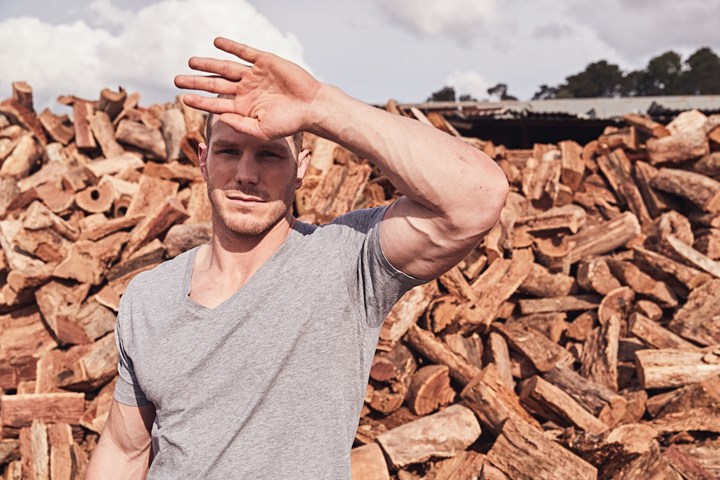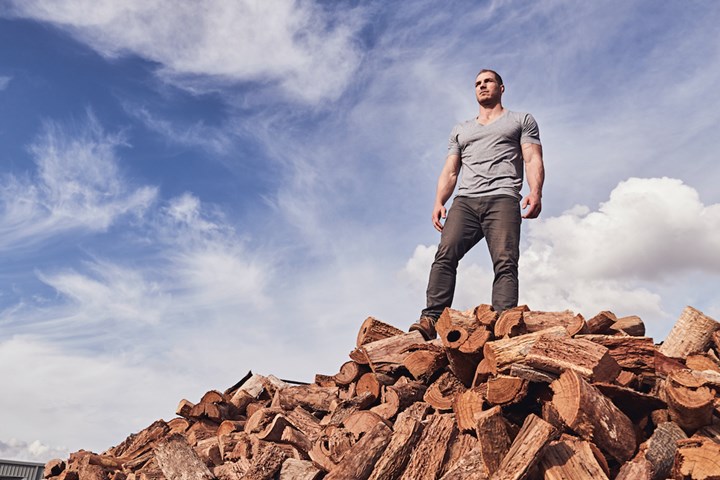You’ve been hanging around in a Canberra log yard with David Pocock. Now it’s time to go and suddenly the man has vanished. He was last seen headed out back, from where the barking of a vicious- sounding dog is ringing out. The minutes tick by until, lo and behold, Pocock reappears, cool as a sax player.
Turns out he’d been searching for the yard boss. He’d wanted to thank him for his hospitality. “Deep down,” Pocock tells me later, “I think we all know what’s right.” It’s the miniature version of a wider narrative. Pocock takes off. Pocock isn’t where others think he should be. But the man himself can shake off their annoyance or disapproval because he’s heeding his better instincts.
In case you missed it, Pocock checked out of Australian rugby last year. As good as he is, as important as he is to the fortunes of his Super Rugby franchise, the Brumbies, and to the Wallabies, he took a voluntary timeout from his duties to both. Instead of packing into scrums and winning turnover ball, he spent six months in his birth land of Zimbabwe, doing a bunch of things that simply wouldn’t for a second enter the head of 99.9 per cent of people. But that’s Pocock. That’s the example he sets. Be your own man. Dance to your own beat. Never mind what’s typical. Do what’s right.
Fortunately for Australian rugby, what felt right for this year was a return to the fold. Pocock’s back in headgear and primed for the Wallabies’ three-Test series against Six Nations champions Ireland this month. Football is his focus again. But it will never be his world.
“Hi, how’s your day been?” That’s how Pocock gets the conversation rolling with Vicky, the hair and make-up person on this pristine afternoon. The game of life seems effortless for him. But it’s really not. Strength of character isn’t immunity from struggle. It’s a basis for dealing with it.
“I turn 30 next week,” says Pocock. He laughs, mirthlessly. “I don’t know. My partner always gives me crap because I usually have a crisis on my birthday.”
A crisis? “I guess it’s a time to reflect on where you’re at,” he says. “On how things are turning out. Whether you feel like you’re living a life that your younger self would have been proud of.”
It’s a remarkable revelation. Many of us are justified in thinking we’ve semi-wasted our time and talents. But Pocock? He’s a giant of his sport, universally admired for his courage, strength and skill. Off the field he’s made his mark as a progressive who’s spoken out on issues from coalmining to sexual equality. You may disagree with him sometimes. But you’d find exactly no one in his orbit who would claim Pocock has been sleepwalking through his days.
“That’s why Em [partner Emma Palandri] gives me a hard time,” he says. “Because I’m always saying ‘I haven’t done enough’ or ‘There’s so much more to do’.” He seems lost in thought. It’s as if you’re not there anymore and he’s ruminating in solitude. “We’ll see,” he continues . . . “Yeah, we’ll see . . . You always want to make the most of opportunities . . . You don’t want to take anything for granted . . . It’s that thing: how do you live a good life? What are your values and how do you live them? How do you stay true to them in a world that demands so much and there are so many competing forces pulling on you?”
So you ask about his values but there’s no pat answer. Instead there’s more grimacing as he says our culture has bludgeoned values to death. “We talk about them so much, to the point where they don’t mean much anymore.”
While Pocock’s musing you look him over, starting at his broad, thong-clad feet. He has several blackened toenails well along the way to falling off. Others are misshapen, as though they’ve been asked to grow back once too often. His shins are a mess of cuts and scabs; his knees bear multiple scars.
Rugby has left all these marks. Rugby, in which Pocock’s knack is to stand astride an opponent and rip the ball from his grasp as rival behemoths seek to missile Pocock into next week. Who couldn’t use a break from that caper?
Feeling weary and battered in late 2016, Pocock approached Wallabies coach Michael Cheika with a request: he wanted a year away from the game. A hiatus, he told Cheika, was his best chance of being fit and fresh for rugby’s next big dance: the 2019 World Cup in Japan.
That was one reason. There was another, this one quintessentially Pocock. Playing rugby for a living is a privilege, he says, “but the flip side is you have very little time to do anything else that’s important to you. I needed some time.” To Pocock’s relief, Cheika required no convincing. “He knows me well enough to know I’m a bit of a weirdo and probably wasn’t that surprised.”
A subset of rugby fans was less sympathetic. To their mind Pocock was a highly paid servant of the game abandoning his post. Pocock was unmoved. “You’re always going to get people who don’t like you or what you’re doing,” he says. “I’m happy to cop that. Everyone wants to be liked but you have to be prepared to make those decisions and wear the consequences.”
For the full story, pick up a copy of the July issue of Men’s Health, in-store Monday 11th June.
















